Student Testimonials - Archive
Additional WTA Testimonials
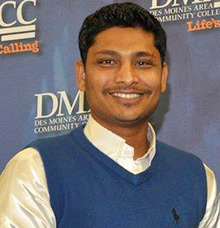 Rabin Shah
Rabin Shah
Originally from Nepal
This past summer I earned my Network Cable Installer certificate with the help of DMACC’s Workforce Training Academy (WTA). WTA not only impacted my life, it made me more confident. Before WTA, I was loading and unloading trucks [at Walmart]. I had no idea how to search and apply for jobs that fit my new skills. WTA helped with all that. The WTA instructors and advisors were so helpful and supportive. They encouraged me, not only in education, but in my personal life too.
Now am working toward an associate’s degree in telecommunications at DMACC West and have an apprenticeship with a telecommunications firm [Commonwealth Communication]. WTA helped me learn to never give up and that I would be successful one day.
Here's what our students are doing...
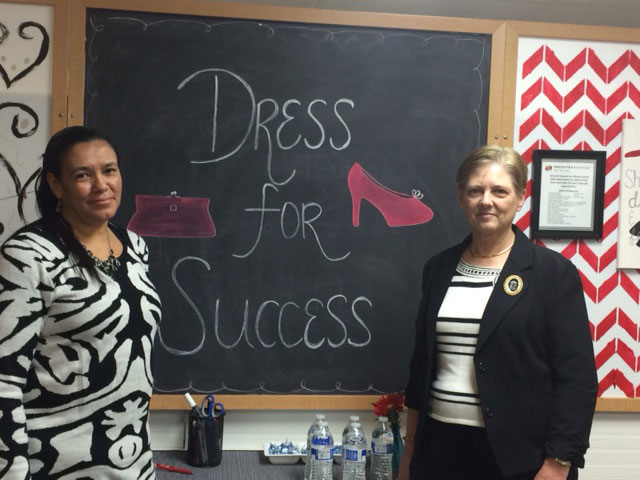
(left to right) DMACC students Debra Brooks Hill and Cheryl McCracken who recently completed our Administrative Support class and attended an event sponsored by Dress for Success. Cheryl is also DMACC's Workforce Training Academy Administrative Assistant.
Here's what our students are saying...
“Everyone has always gone above and beyond to help and did it with a smile on their
face. When I describe this journey to anyone I tell them how about the unique team
that walks with you the whole way. Everyone involved brings a special expertise and
experience to share. From going to the (DMACC) Transportation Institute to get more
information, to turning in required paperwork, the classes, resume building, job searching,
and even last night there has always been someone smiling, offering help, support,
and congratulating students like myself. I know I worked hard to get where I am now,
but there is no way I could have done this without the opportunity and the staff.
Thank you!”
--Hannah
“I gained a lot of great experience and had a few job interviews. I found the experience
to be very empowering.”
--Bridgett
“At my age, going back to school, this gave me an opportunity to be the best I can
be. It finally opened the door for me to reinvent myself in today's market. [My new
path] is totally different from what I was used to. I was able to see my full potential
and take advantage of the opportunities that offered.”
--Thomas
“Having a minimum wage job to keep yourself from going down financially, will only
work temporarily. I thought that I was always going to have to fight to get anything.
I needed to know that I could actually achieve [my career goals] and that if I tried
one more time, it could work…and it did. Your help was critical, it simply would not
have happened without you.”
--Robert
2017
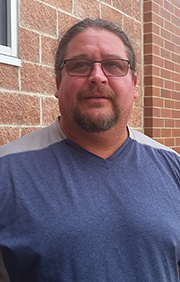 Robert Torgerson
Robert Torgerson
Going from “Crushed” to Cruising
By the time Robert Torgerson first visited the Evelyn K. Davis Center for Working Families in 2014, he had already traveled a rugged road.
“I worked in construction for decades after a divorce,” said Torgerson, a native of metro Des Moines. “I just could not make it. I was broke every year, thinking next year I’m going to get it done. I ended up homeless. It happened every ten years.”
Torgerson said trying to live on eight to ten dollars per hour puts you “right at the edge.”
“Something happens like you get behind on child support, and then the freight train starts. It takes six months, eight months and then you’re homeless. From there you just start doing anything you can to relieve the pain.”
The bleak cycle motivated Torgerson to finally take a different path. “You can get a guy down, and he can make it back up, but when you’re crushed, you give up. You say, ‘Alright let’s go for disability somehow,’ and you suck off the system for the rest of your life. I was able to work. So I just had to.”
Thanks to Hope Ministries’ Bethel Mission and Door of Faith Programs, Torgerson started to turn the freight train around and stop the self-medication. He spent about 18 months working on personal issues and making a new life plan, one that included gainful employment.
“You have to make $40,000 a year or more. Once you move up a level, now you’re paying for everything, you don’t qualify for any assistance. I gotta be legitimate,” Torgerson said. “I can’t be working cash jobs all the time not paying my child support because basically, you’re cheating when you’re working cash and not paying what you owe.”
He heard about the Workforce Training Academy during his time at Door of Faith. After getting into the WTA program, Torgerson’s career journey gained speed as he entered DMACC’s truck driving course.
“I was fortunate. I had a clean driving record and no criminal record, so I was gold to the trucking companies. Other people may have a bigger challenge. I knew with a clean driving record they were going to want me. I still had my driver’s license. A lot of people who are homeless don’t.”
After the twelve-week program, Torgerson found himself in demand. “Driving companies recruit right out of the (DMACC) training center. They come to you. I believe their placement rate is darn near 100 percent. Everywhere in the country they’re screaming for truck drivers, especially females.”
With a starting salary of $40,000, Torgerson finally covered the last leg of his journey back to self-sufficiency. Now the 49-year-old formerly homeless man drives a $150,000 semitractor-trailer carrying thousands of dollars’ worth of cargo more than a hundred thousand miles a year. Trucking companies offer various schedule options. Torgerson chose to be on the road eleven days and back home for three.
He said the WTA program’s initial assessment test needlessly intimidates a lot of potential participants.
“People are hesitant (to take the test) because they don’t really feel they would succeed. They don’t want one more failure. I tell them to just do it. They think the college entrance exam and that you don’t get in unless you pass it. They don’t know that you can’t fail. If you need help in some area, you’re going to get it.”
The massive U-turn in Torgerson’s life journey had created many tangible benefits. “I paid off my child support on my birthday a year and a half ago. I have money in the bank, no debt, no credit cards, now all that’s left for me to do is buy a house,” he said. “My spirit has changed.”
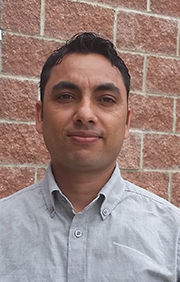 Dadi Subedi
Dadi Subedi
Taking a Different Track in the Land of Opportunity
Even though Iowa and the country of Nepal are 7500 miles apart, a former Nepalese school teacher has found a common thread between the two very different places: the opportunity to help people.
Dadi Subedi, who worked as a school teacher in Nepal, came to the U.S. in 2011. He and his young family lived in Utah for four years before moving to Des Moines in 2015.
Subedi said he left Nepal due to political unrest. “Human beings need freedom and America is an amazing country in which we can live freely. America is the land of opportunity.”
Early thoughts of getting a job as a school teacher in the U.S. didn't pan out due to challenges of having English as a second language.
"I had a big challenge,” Subedi said. “I lived in an apartment. I had to pay my bills and pay my utilities right away. So it was a challenge and worrying situation going on in my life.”
After many applications and no response for various jobs, Subedi landed a job in the housekeeping department of a hospital.
“I love to work with people. I’m people oriented. The hospital and people are directly connected to each other. It was an amazing job, and I loved it, but I was trying to walk a different track. One day a good friend of mine talked about the Workforce Training Academy. And I was really curious.”
Subedi said he was also a bit nervous the first time he entered the Evelyn K. Davis Center for Working Families but was quickly put at ease by the people in the center. Keeping with his desire to interact with and help people, he selected patient intake and billing from the available courses.
The combination of taking classes while working full time created an ambitious schedule. “I worked from 7 a.m. to 4 p.m. and took class from 6 p.m. to 9 p.m. That way I could still help my family. It is a really amazing place and amazing course.”
Subedi credits his wife, Lila, daughter Nipshika (age 2), and son Nishal (age 6) for their strong support, as well as his mother, Tila, and father, Mono.
After graduating from the class, his manager at the hospital told Subedi there was an opening in the patient access and billing department.
“I applied, and they hired me. It was a great experience in my life.”
Subedi said he likes the DMACC patient intake and billing course because “it has a really big platform. It’s not only for hospitals. If you are trained you can work in clinics, any billing department.”
He plans to continue his education at DMACC in the coming months, and he recommends the Workforce Training Academy to his friends and other members of the large Nepalese community in Des Moines.
“You come here and they will accept you,” he said. “It doesn't matter what background you have, what color or race you are, they accept you and lead you on the right track.” All you need to do is make the first move and inquire at the center, he said.
“Many people like me who really want to do something for their future to change their lives, please, don’t wait. DMACC is with you and can help you change your life. I’d like to thank all the DMACC family who organized this great amazing program.”
2015
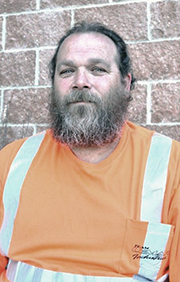 Terry Ault
Terry Ault
On the Road to a Bright Future
If you could go back in time to 2005 and ask Terry Ault where he would spend his days in 2015, he would have said "prison cell" was far more likely than "semitrailer cab".
But, thanks to some open-minded Central Iowa employers and a recent assist from the Workforce Training Academy, Ault does indeed spend his work days on the open road delivering goods to towns in Iowa, South Dakota and Illinois.
The first step in Ault's journey from prison cell to semi cab was hardest. “My working career didn't start until 2005 (when Ault was 38) when I actually decided that I was going to try to do something other than be a knuckle head.”
Despite hearing “no” repeatedly on his initial job quest, Ault finally found work as a laborer with a central Iowa transport and storage company that delivered and installed heavy equipment.
After several years, Ault got a new job with a company that delivers and installs catwalks in grain storage operations.
In 2013, Ault's employer was purchased by another company, which led to a reduction in labor force. “The people who bought them out didn't like my record,” Ault said. He wasn't exactly back to square one — what with his solid, seven-year work record — but a new job was still hard to find and Ault was unemployed for about a year.
The road to employment took a positive turn when Ault came to the Evelyn K. Davis Center for Working Families in early 2014 for another program and learned about the Workforce Training Academy.
He was interested enough to take the National Career Readiness Certificate (NCRC) test required for admission. Ault admits being apprehensive about the test.
“But I sat down and took it and I was actually really surprised that it was mostly just life stuff,” said Ault, a California native who has lived in Des Moines since 1985. “Even though it's math and reading and stuff, they put it in life situations so it was easier than a book test.”
Ault's scores indicated he was ready to jump into training. He chose the 60-day semi driving school offered at DMACC's Transportation Institute.
“It was an easy experience,” said Ault. “Usually, trying to get into school is hard, everybody here helped me with everything I needed and it was quick. Within a matter of two weeks I was going to school.”
After passing the semi driving course with flying colors in January of 2014, Ault's career popped into high gear. A friend connected Ault with his current employer and since mid-February 2014 he has worked full time driving a semi and delivering goods for a Central Iowa company.
“I just have a blast; I love it,” he said. “This has been the most fun year (of work) I've ever had. I just love being out there (on the road). Even though I'm told where to go and what to do, I'm still my own boss all day long. It's pretty neat and I get to see a bunch of the country.” Ault does day trips to the east and west boarders of Iowa and into South Dakota and Illinois.
Ault said not only is he grateful for the assistance from the Workforce Training Academy, he often recommends the program, especially to those with a similar background. He said one of the best parts of the WTA is that it offers training for real jobs that are actively looking for employees, which increases the odds that people who put in the effort to get training will eventually be rewarded with a good job.
“One of the best parts of the whole deal, making the money,” Ault said. “You don't have to struggle anymore.”
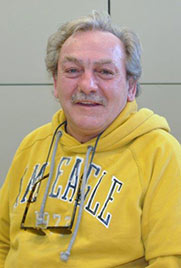 Thomas Beil
Thomas Beil
From Transient to Tradesman
For most of his nearly 60-year life, Tom Beil has been an American nomad or a “super tramp,” as he describes it.
“I've done some cool stuff,” said Beil, who grew up in Wisconsin. “I got bitten by a shark riding a manta ray in the Indian Ocean. I walked the Great Wall of China, been to Hong Kong. I hitchhiked to all 48 states before 15 years old.”
Work doing landscaping for a friend originally brought Beil to Des Moines in 2007. His life was a series of odd jobs here and there, scraping out an existence, often migrating to Hawaii for the winter. But there were also some not-so-great moments. “I lived in a shed no water no heat, so it was kind of an odd life. In the winter I'd have 38 pounds of blankets on.”
Finally the vagabond, “free spirit” lifestyle started taking a toll and Beil decided he wanted something more. Freedom to travel the world just wasn't enough.
“I've wasted so much of my years,” Beil said. “I could have been a champion. I could have been an asset to society, not just think that society needs to be an asset to me.”
The attitude change led Beil to the Evelyn K. Davis Center for Working Families and DMACC's Workforce Training Academy. Deciding he wanted something more than drifting around the country was only the first hurdle. The second hurdle had been built very high by decades of self-reliance.
“I never really wanted to ask people for anything,” Beil said. “It wasn't my nature. I figured if I couldn't do it on my own, what the heck was I doing here?” The people at the Evelyn K. Davis Center helped Beil to quickly overcome his hesitations.
“It was a lot of the people there, getting to know them and them accepting me for who I was, that made it easy for me and comfortable for me,” said Beil. “It wasn't really me asking; it was them just saying “What do you need? Just say it. Let's see if we can find it.”
Beil hopes to use the WTA's Building Maintenance program's courses in electrical systems, HVAC (heating, ventilation, air conditioning), and plumbing to start a business that serves lower-income home owners. He also plans to add DMACC credit courses in welding to further his business plans.
During his first semester, Beil said he absorbed in the education DMACC offered like a sponge.
“I want to take this chance to recharge me,” Beil said. “I'm a good person. I'm open, polite, smart, tired of being in the lower (economic) class. I picked the wrong people when I was younger. Now I'm here and I'm willing to work my way wherever I go with the talents and certificates. The appreciation is beyond belief for what they (WTA) have done for me and my education.”
Beil also hopes the story of his lifestyle epiphany will help inspire others to make a similar change.
“Never look down on yourself that you can't do anything in the world,” Beil says to those considering changing their lives through the WTA. “Find a field that you're interesting in — nursing, welding, maintenance, whatever it is — and go find your dream. Go find it. Go do what you can do, do the best you can do, and you'll have rewards of life and of being confident. You will have great well-being after you've completed your education and schooling and figuring out the trade that you want. Just go for it. Don't let anything get in your way.”
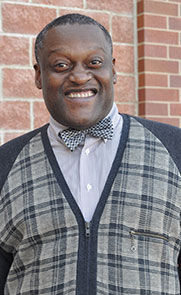 Richard Fisher
Richard Fisher
Finding the Bright Silver Lining
Sometimes triumph really does come out of tragedy. Just ask Richard Fisher.
Fisher was born in Des Moines, but moved at a young age to Minneapolis where he lived for 35 years.
“I thought I'd never come back,” Fisher said. “I thought I had a nice little life up there.” Unfortunately, Fisher said looking back, his life in Minnesota included substance abuse and other challenges.
That's when a loved one's illness gave Fisher's life a dramatic U-turn. “I guess the Lord had a different plan,” he said.
Fisher's mother, Emma, moved back to Des Moines in 2005 and became ill soon after. That caused Fisher to also move back to Des Moines — and away from his old lifestyle — to be closer to his mother.
After Emma Fisher died, Richard found himself in a new city with new challenges and opportunities. After a few low-skill construction-related jobs, he made the life-changing decision to use education to build a better future.
“I knew I needed to do something better than work on an assembly line, driving a fork lift, or lifting things that weigh 50 or 100 pounds all day,” he said.
That desire led him to the Workforce Training Academy where Fisher, now in his 50s, selected a field that would let him stop working with concrete and start working with computers: administrative support.
“I'm an older gentleman,” Fisher said, “I needed a skill. If you lift 50, 100 pounds all day and hurt your back, that's it.”
As a manual laborer for his entire life, Fisher had a lot to learn. “I'm old-school, so I had to learn about computers from the beginning,” he said. “The DMACC courses were very helpful.” He also found the resume help and mock interviews offered by the WTA very beneficial in preparing for his job hunt.
After graduating with his certification, the challenges continued for a man with only series of labor jobs on his resume. He hit the job fairs, did some networking, but ran into the same roadblock.
“No experience,” Fisher said. “That's what I kept running into, 'No experience.' Everywhere I went.”
To get experience and references, Fisher started working for Goodwill Industries. After three months there, he tried again and found a job as a front desk worker at a Des Moines hotel in early 2015.
Throughout what Fisher called a “long journey,” he said he stayed determined. “I knew I had to complete the course.” He said the Workforce Training Academy can help others succeed if they have a similar attitude.
“It's a great opportunity that people should take advantage of,” Fisher said. “You can do it if you stay dedicated and focused on what you want to do.”
He said maintaining that dedication and determination was a big challenge that caused some of the students in his classes to stumble. “I saw people drop out late in the program and I thought, 'That's crazy; when someone else is paying for it? That's just crazy.'”
The experience has also turned Fisher into an advocate for the life-improving power of education.
“I tell people education is very important,” he said, “Whether it's getting your GED or HiSet or getting a skill that can get you a good job, you need to get some education.”
For Fisher, the power of education has helped transform what started as bad news of his mother's illness into the good news of a new career trajectory. Fisher can credit his own attitude and determination along with the educational and support programs of the Workforce Training Academy for the turn around.
He also gives credit to an even higher power. “The Lord has a way of taking something that doesn't seem very good and making it into something that is very good,” Fisher said.
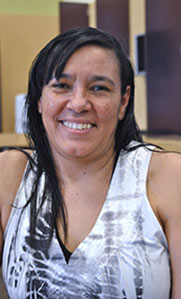 Debra Brooks Hill
Debra Brooks Hill
Finding Opportunity through Reinvention
When Debra Brooks Hill offers advice to people faced with employment challenges, she speaks from experience:
“You don't give up,” she said. “You keep going; you keep reinventing yourself, so to speak, to incorporate yourself into the modern career world.”
Brooks Hill's reinvention journey started in her native Des Moines, took her to Chicago for nearly 30 years, and then brought her back to Des Moines four years ago. It included several jobs, a couple of layoffs, and finally an office manager position with the Des Moines school district which was within walking distance of her Des Moines home.
After losing her job in Chicago, Brooks Hill decided Des Moines offered a better environment for raising teenagers, so in 2011 moved back and enrolled her kids at her alma mater, North High. She soon landed an administrative assistant job, but the pay wasn't enough to support her family. So Brooks Hill took a new job, only to be laid off in a reorganization.
Time for another reinvention. Brooks Hill lives within walking distance of the Evelyn K. Davis Center for Working Families and one day decided to walk in and see what they had to offer. Recognizing that finding a better paying job required her to update her office skills, Brooks Hill enrolled in Des Moines Area Community College's Administrative Support Professional program through DMACC's Workforce Training Academy.
“What I found most beneficial was the information that we got from our teachers and how concerned they were about the things that we learned,” said Brooks Hill. “As a student, even though you have a certain skillset, you need someone who has the patience to lead you in the right direction to get through certain office software programs.”
She said the small class size allowed for students to get all their questions answered. Instructors went above and beyond to be accessible to students, even providing their private email address and home phone numbers, and made students aware of job openings they might have missed otherwise.
“I think the job opening resources they gave us were almost more important than the skills we learned, because nowadays you need that type of inside information to find the jobs that are out there,” Brooks Hill said.
After finishing the course, Brooks Hill found a temporary job as a payroll clerk with the Des Moines school district, which led to a full-time job as an office manager in a school in her neighborhood.
Since then, she's referred many others to DMACC including her son who is in the DMACC construction trades program and her daughter who is set to start DMACC's surgical tech program on the path to becoming a registered nurse.
The Workforce Training Academy is a great first step, Brooks Hill said, whether your goal is to get a job in a few months or a bachelor's degree in four years.
“Not everybody wants four years or even two years of college,” Brooks Hill said. “I'm at that age where I want some skills to get a job now. I'm not looking to go to a four-year university.”
Brooks Hill said the WTA is also a great place to go if you're not sure what you want to do.
“I'm always telling people who don't seem to have a direction for what they want to do with their lives — either because they got stagnate or because they're young and can't focus — go up to Evelyn K. Davis center, look at the DMACC programs that you can get into, and get your life back on track."
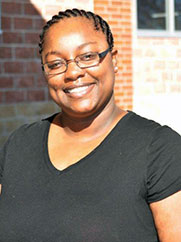 Telisha Kinney
Telisha Kinney
Working Toward a Dream While Inspiring the Next Generation
One of the biggest incentives for Telisha Kinney to stay on track to become a registered nurse comes from her visits to “Dr. TeAsia.”
Make that Future Doctor TeAsia, better known as Kinney's seven-year-old daughter.
“We have our moments where we play doctor,” Kinney said. “She's the doctor and I'm the patient. I teach her the protocol on how to go about a certain thing. She has her piece of paper and she has her pen, and, says 'Can I help you?' We go through the whole thing step-by-step. So it's Dr. TeAsia who I see. She has the gloves and she has all the equipment. It's really amazing to watch her.”
TeAsia caught her physician fever from Kinney, who went through the Workforce Training Academy to restart a medical career of her own after an unsuccessful first attempt.
“I worked as a medical assistant for about three years and it didn't work out for me,” said Kinney. “I still wanted to be a part of the medical field so I looked into DMACC's registered nurse program. One of the requirements was the CNA (Certified Nurse Assistant) and the Advanced CNA as prerequisites to get into the nursing program.”
A friend at church recommended the Workforce Training Academy as an avenue to achieving the CNA certificates and Kinney entered the program in the fall of 2014. She graduated from the CNA and advanced CNA courses and plans to enter the DMACC registered nurse program in the fall of 2015.
Kinney said she found the Workforce Training Academy's “Navigate Your Journey” sessions extremely helpful.
“I thought that class was amazing,” she said. “It helped me as an individual to break down what I needed to take care of first. It gets you to realize where you're at and then determine what steps you need to take to get to your goal.”
Kinney said Navigate Your Journey revealed that her challenge was maintaining balance.
“I'm a single mother. I go to church and then I'm in school full time. How can I balance that? They were able to show us different ways. We had a journal that we wrote in and activities that we did. We also talked with peers who were in the same program to see, 'Where are you at? How did you get there?' It was just getting to know one another and then using each other's ideas to put our own plans together. I thought that was really nice. I actually still use it today.”
Kinney said her inspiration to become a nurse came from an aunt who had a bachelor's degree in nursing.
“I just was so amazed by the stories she would tell and I just grew an interest at a younger age and then over the years I would ask doctors or nurses, 'What did you have to do? What's the most amazing thing that you've seen?' Then my desire to be in the medical field grew over time. I just said, 'I have to go for it.'”
Now, with an assist from the Workforce Training Academy, Kinney is paying her aunt's inspiration forward to her daughter, TeAsia, who reciprocates with moral support.
“She's seven but she's very encouraging,” Kinney said. “The further you go into the nursing program, of course the more difficult it will be. She says, 'Mom, you can do it. You can do it. You can get it done.'”
When TeAsia first started talking about following her mom's career path, Kinney urged her to aim high.
“I said to her, 'Don't stop where I am. If you want to go further, go further," Kinney said. “She (TeAsia) said "What's the next step?" I said, "doctor.” So now she wants to be a doctor. She keeps talking about it.
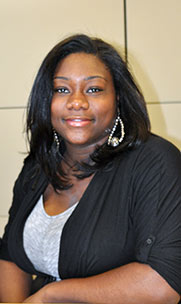 Tanisha Madison
Tanisha Madison
Procrastination Broken by an Epiphany
When you're young and have your whole life in front of you, it's easy to use “eventually” to push off career decisions. That's exactly what Tanisha Madison did.
“I've always known I was going to go into nursing,” Madison said. “I just procrastinated a lot. I'm not going to lie about that. I'm a huge procrastinator.”
A native of Chicago, Madison moved to Des Moines at age 15 and graduated from East high school. She took her first step toward a nursing career by becoming a Certified Nurse Aid (CNA), and followed her sister's footsteps into home health care. She planned to continue on the path toward becoming a registered nurse, but inertia set in.
“I always knew I wanted to get my nursing license, but I thought, 'Oh, I'll make money first and then I'll eventually go back to school.'”
The years ticked by until reality finally overcame procrastination. On the recommendation of her best friend, Samantha, Madison came to the Workforce Training Academy in the summer of 2014 and enrolled in the next step: getting her Advanced CNA certificate. During the Navigating Your Journey class that's included in the Workforce Training Academy program, Madison had a “big moment” when she discovered a disconnect between her job aspirations and her desired lifestyle.
“I just had an epiphany one day and realized that I really want to own my own home,” Madison said. “I can't do that off what I'm making as just a basic CNA, and after the Journey class, I realized I couldn't do it from what I would earn as an advanced CNA either. So I need a career. Something to retire from.”
With her sights adjusted from a short-term job to a long-term career, Madison decided to enroll in DMACC's registered nurse program.
Not only did the Workforce Training Academy and DMACC provide Madison's career epiphany and her advanced CNA training, they also provided career readiness classes that helped with creating a resume and practicing interviews. The program even connected Madison with a way to get the inoculations required to work in a hospital setting.
At age 25, Madison is now an advanced CNA and hopes to work in one of Des Moines' hospitals, possibly taking advantage of an employers' full or partial tuition reimbursement program as she continues toward her goal of becoming an RN.
She refers people to the Workforce Training Academy often.
“I actually always go to the Burger King by my house (in Grimes) and there's this guy, he always gets my order and I told him about it and he's like, 'What? Really? That's something I would like to do.' I've referred a lot of my family members. My friend that lives in Texas might be moving up here, so I told her about the program too because I mean, hey, why not? Try and get certification in something so you can find a better job.”
Madison said her message to potential students is “it's going to help you in the long
run. They're going to work with you and your schedule. It's going to be better for
you and your family.”
With things going well, interviews in hospitals and steady work as an advanced CNA,
any chance procrastination will take a hold again?
“I always said I'd eventually go back to school. This is my eventually. I'm definitely going to stick with it,” Madison said. “I have to have a career by at least twenty-eight. Yeah. I got this. I'm sure. I'm positive.”
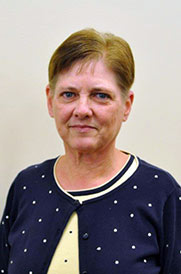 Cheryl McCracken
Cheryl McCracken
Finding the Right Job at the Right Time
During her two years of unemployment, Cheryl McCracken applied for 230 jobs.
“It was my full-time job every day,” McCracken said. “I'd be up between 7 and 8 in the morning, eat my breakfast and go to the computer and just look for jobs all day.”
Those 230 applications resulted in 17 interviews in an odyssey that ran through the Workforce Training Academy and eventually to a job that McCracken believes is heaven sent.
Prior to unemployment, McCracken had a full-time job in food service with the Ankeny school district. It seemed perfect for a mother with kids in school.
“I needed to be off in the summers. I needed to be off spring break, Christmas break, all the times when the kids would be off so that I could be at home and take care of them,” McCracken said. “That's when someone had said 'Well, why don't you apply to work food service for the school district?' I worked there for 10 school years before I was laid off in May 2012.”
McCracken saw opportunity within the disappointment of losing her school district job. She had worked as an administrative assistant early in her career and saw the layoff as a chance to revive those skills and find a job that didn't require her to be on her feet all day.
But comparing office computer programs from 15 years ago to those of today is like comparing a Model T to a Ferrari. McCracken needed a skills tune up. She saw an ad for the Workforce Training Academy and decided to enroll in the Administrative Support Professional certificate program.
She said the DMACC program did a good job of getting her up to speed with the latest Microsoft Office products. It also included some insight on how to work with people of various personality types. After earning the certificate, she launched what turned out to be a two-year mental endurance test.
“You start questioning yourself wondering 'What's wrong with me? Why can't I get an interview?'” McCracken said.
She soldiered on until she finally landed a part-time administrative assistant job at DMACC's Southridge center in early 2014. McCracken took the job — part time is better than no time — and saw it as an opportunity to build experience and references. That job led to a full-time position later in 2014 as an administrative assistant with DMACC's Workforce Training Academy, which is where her career retraining began.
“Now that I kind of think back, I think God had a plan for me. So I didn't get all those other jobs that I thought I should've gotten,” McCracken said, “because, had I gotten those jobs at other employers, I never would have found this job.”
Along with enjoying the work, McCracken said she's glad to use the lessons from her long career search to encourage and support students who are on the same path.
“I think I was put right here at this place for a purpose, and that is to serve these students who are in the same predicament that I was in,” she said. “I understand exactly what they have to go through, how they're feeling, and the steps that they have to go through with us here at WTA. I had to go through those too. So I think that's really a good reason why I got this job. I feel like I'm just the perfect fit.”
2013
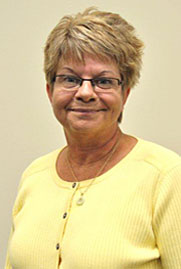 Deborah Buster
Deborah Buster
Rebounding from Adversity
Deborah Buster was quite happy in her job of 22 years in office administration, right up until the slumping economy delivered bad news: layoff.
That sent Deborah into the confidence-crushing cycle of hire-layoff-hire-layoff that many employees went through during the last five years. Then her mother became ill. Out of those two negatives — job trouble and an ill parent — came a positive spark that led Deborah to the DMACC Workforce Academy Training center.
The day of her mother's release from the hospital, there was a nurse waiting for them at home. The nurse showed Deborah how to administer her mother's antibiotics through a pic line three times a day for 12 days. Each session took 30 minutes.
"The first time I did it I was scared, but that fear soon turned to a feeling of 'I can do this; I like doing this and maybe I would like to pursue a career in the medical field,'" Deborah said. "With the cycle of endless job's I'd had in the last few years, I feel that it took my mom becoming very ill to find out what my real calling in life was. I had to convince myself that regardless of my age, this was a chance for a new chapter in my life."
Medical fields are among the fastest growing in the country, but every job requires specific skills and training. That led Deborah to DMACC where she had briefly been a student after graduating from high school. The Workforce Training Academy helped connect Deborah with DMACC training. After the WTA's initial three-session orientation and evaluation step, Deborah found out she qualified for the program and chose a healthcare course.
By the time Deborah got to the DMACC WTA, she had been through the spin cycle of hiring and layoff several times. Her confidence and self-esteem were at all-time lows.
"Going into it I was very apprehensive wondering 'Am I going to be able to do this? I've been out of school for 30 years' " said Deborah. "My fellow students and I had a real connection that began on the first day of class. Different backgrounds, different situations, but yet there was an amazing connection. Between the instructor, classmates and the WTA faculty, there was a family-like bonding. Everyone wanted to see you succeed. They knew your name and were always available if you had questions or concerns. They were always there to encourage you regardless of what you may be going through on a particular day."
Deborah said she found the WTA's workforce readiness program very beneficial in boosting low confidence and self-esteem. She got help and guidance in putting a resume together and was able to practice for job interviews.
"We did mock interviews," she said. "Because I was going into the health careers, I actually had a mock interview with someone from human resources with Methodist Hospital. You go in just as if it is a regular interview, and then they rate you and evaluate you and that is sent back to the teacher."
The mock interviews were evaluated for strengths and weaknesses. They also serve as dry runs that greatly reduced the stress of going to an actual interview, Deborah said.
Deborah's initial "Essentials for Health Care" program led to a class to be a Certified Nursing Assistant (CNA), then advanced CNA and soon phlebotomy. She works as a receptionist at the Evelyn K Davis Center - DMACC Workforce Training Academy offices while continuing her training. Through the whole process, Deborah has had an advisor tracking her progress, making her aware of job openings and making sure she follows through on her plans to enter the healthcare field.
She strongly recommends the Workforce Training Academy to everyone, including people who find themselves facing the challenge of finding a job after decades of steady employment.
"It's a wonderful program and with additional training, you become more marketable," she said. "There are a variety of programs offered and I get excited when I have the opportunity to share my success story of completing the program with prospective students."
Most of all, DMACC's Workforce Training Academy helped Deborah rebuild confidence and self-esteem that had been battered by waves of economic bad news and the ups and downs of life.
"I don't come from a big family," Deborah said. "My classmates, teachers and the center have become like family. To this day, several of us stay in touch with each other. By completing the program, it not only gave me additional training but it also brought new friendships into my life."
 Lisa Fish
Lisa Fish
Finding a Purpose
After 10 years as a home health care aide, Lisa Fish heard the d-word ("downsize"). Two aides and one nurse from her former employer were suddenly out of a job.
Like thousands of others Iowans over the last few years, Lisa filed for unemployment and started looking for work, which meant a trip to the workforce development office in downtown Des Moines.
They took a look at Lisa's work history and told her what she already knew: she needed more skills to be more employable.
"I knew I needed to do that," she said. "I was just a home care aide; I was not certified at anything. Yeah I can wash backsides, but who's not qualified for that? It was a qualification thing. I knew right away that schooling was for me."
After contacting DMACC's Workforce Training Academy Lisa discovered that her layoff was an opportunity to get those skills. The WTA provided the financial aid she needed and helped her identify the right career field. She went through the three-session orientation process and then after being approved for funding, she was enrolled in a medical billing training course.
Lisa's biggest surprise was that what she thought would be drudgery actually turned out to be fun.
"I like to learn," said Lisa, "but something that did surprise me was that I could learn and retain it and not go, 'I'm bored with this homework.' It was exciting for me to learn it. I was thinking it would be more along the lines of, 'Yeah, whatever, I'll do it,' but as I got into the class further and further, I discovered it was fun."
Lisa said the program's emphasis on readiness in the areas of resume preparation and interviewing skills were also a great help.
"It definitely helped me prepare and convinced me that you could get back out in the real world, shall we say, because I didn't know anything about resumes or any of that stuff or how I should dress, how I should speak with someone," Lisa said. "I also wasn't any good at talking about myself. I mean I don't mind talking about 'Oh, yeah, I'm a mom of six and I have 20 grandkids' that kind of stuff. It's hard for me to say, 'Well, you know, I'm your best candidate because I can do this and this and this and this.' I'm just not comfortable doing that."
Lisa said the Workforce Training Academy helped move her from working for a paycheck to having a purpose.
"It's hard to explain," Lisa said. "When I was at home and not working or doing anything, I didn't want to go or do anything. When I got into the program and got into this schooling, it was like, oh, I've got somewhere to go. I can do something. It gave me a purpose."
Her purpose-driven efforts soon resulted in a full-time job as a receptionist/scheduler/operator at a Mercy Hospital in Des Moines with lots of opportunity for growth and advancement within the organization. She credits DMACC WTA with providing job skills needed to land the job, and most importantly creating that sense of purpose.
"It also really gave me my confidence back," Lisa said. "It made me feel like a person again. It felt horrible to get laid off because I had been there for 10 years."
She strongly recommends the WTA. "If I can do it, believe me, anybody can do it," she said. "I recommend people do it because it helped me a lot."
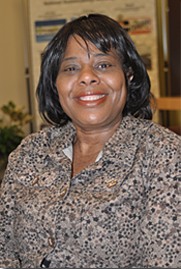 Hilary Mallett-Astete
Hilary Mallett-Astete
Networking and "Build on What You've Got"
Trying to re-enter the work force after six years away due to vision loss is challenging to say the least. For Hilary Mallett-Astete, the DMACC Workforce Training Academy proved to be a great place to re-integrate and rebuild her professional network.
Hilary had only been in Iowa for two years and was working with her vocational rehabilitation counselor, Rosie Thierer, and the Iowa Department for the Blind to adjust her lifestyle after suffering her vision loss. Counselors there referred her to the DMACC WTA. Hilary had previously worked as a staff accountant in the accounting and finance industry. DMACC's financial services courses offered promise of helping her find a new job in a familiar field. "You have to build on what you've got. I had a finance background and I could talk, so it kind of joined the two."
The process of "building on what you've got" led Hilary to the WTA where she chose courses in financial services customer service. While the training was excellent, Hilary said the program also helped her start to rebuild the all-important professional network.
"I was able to, through networking, to meet different people, come in and talk with some different companies," she said. "The other people that were in the class, it was kind of nice to be in a group of people who had also recently lost employment or had been unemployed for a while. Those connections were one of the greatest parts of the program. It gave me a connection with the real world, coming back and working with everybody else."
Hilary was initially interested in training for a job in medical records, but the WTA orientation sessions helped her decide to focus on financial-related customer service.
Going from being sighted to visually impaired brings enormous challenges in all areas of life. Among them was mastering technology she'll need to do the job of a customer service representative.
"The area that I found myself being most concerned about was, 'Okay, how will I go about going for an interview?'" she said. "I was told to go through the program, do the mock interviews — being able to sit down and go through an interview with somebody. Something I was concerned with was how will I be able to connect with somebody if I don't have the visual?"
Three mock interviewed offered as part of the WTA helped allay Hilary's fears. In fact, Hilary's third mock interviewer, a recruiter from Nationwide Insurance in Des Moines, suggested Hilary apply for an open position at Nationwide. She was hired and started work on Oct. 1.
"It was like a gift. Truthfully, I wanted to work really badly and I am so happy that it all worked out the way it did because it seemed like it all came together, I guess. It took a while to get started, but once I got started I was in."
Now fully employed, Hilary has referred others to DMACC's WTA program. She said it's a great way to recalibrate your career after experiencing economic adversity.
"If you've done one job and there is not a market for that job anymore, this is a good way to re-enter and try to do something that maybe you didn't know anything about, but you learn and you go from there," Hilary said. "The networking allows you the opportunity to step back in and get the contacts within different organizations that are affiliated with the program."
 Joe Nash
Joe Nash
Following a Recipe for Success
Joe Nash is no stranger to education. He has an associate's degree, bachelor's degree and even master's in quality management. Nevertheless he found himself unemployed in 2009, and then either unemployed or underemployed for the next two years.
Jobs for people with master's degrees in quality management are scarce in Central Iowa, but fortunately jobs for welders are plentiful. So, at age 50, Joe came to the DMACC Workforce Training Academy to adapt to a new economic reality.
"I think the hardest part was just not looking back," said Joe. "The hardest part of change is realizing that nothing is ever going to be the same again. The people who know me know I don't look back and some people that bothers them because I don't get grounded in unfortunate things that happened in the past. I need to look forward to this opportunity and what really helped was just when I got connected with DMACC."
Joe said he discovered the WTA while looking for work at the workforce development office in Des Moines, and emailing friends family in search of job opportunities. Joe had attended DMACC earlier in life and felt comfortable checking into job training there.
"I think the thing that surprised me the most was how much the employment landscape had changed since I applied for my first job in 1983," said Joe. "I did work in radiology. That was my first job. I went to Methodist Hospital and went to the radiology program and back then we typed and we used carbon paper and things like that. Come forward to 2012 and people have covered an awful lot of ground since then and acquired education and skills and such. The shocker is how specific businesses want your resume to be. If they're asking for A, B, C, D, E then you need to make sure that is on your resume. The counselors at Workforce Training Academy were really helpful there."
Joe said he got help in structuring his resume so it communicated to employers that he had what they were looking for. "They helped me not have to dumb down my resume but, put it in a format that said here's what I have. Here's the game I got going. Here's what you're looking for and this is what will match."
The WTA orientation program also did a great job of informing Joe and his classmates of services through DMACC and community social service organizations that can help maximize the possibilities for student success, Joe said.
His DMACC training eventually led Joe to job in the maintenance department at EFCO, a Des Moines company that makes concrete forms used in construction around the world.
Joe said his experience proves it's never too late to find work you really enjoy.
"It's hard to believe but it took me almost 30 years to find something that I love doing and I love what I'm doing right now," he said. "I've always been in a service position. I'm always trying to help people and here I find myself in maintenance now. You're going out and you're helping people with orders for work to be done and to get their area of the plant up and going, to maintain what already is so that it doesn't deteriorate, and make sure that your facilities are ready for the next day."
Joe highly recommends the Workforce Training Academy and advises students to dedicate themselves to following the program, step-by-step.
"I think it's like following a recipe," said Joe. "It's like putting a model together. Follow the instructions (through the WTA) to the letter and you will have a higher likelihood of finding gainful employment than trying to poke around in the dark, do it yourself, or just leave things to chance. What I was doing was playing darts in the dark. What I got out of Workforce Training Academy was insight into what I was doing wrong when I was looking for a job and what doing it right looks like."
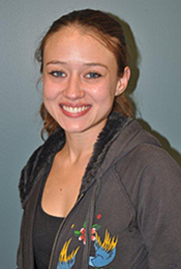 Natasha Wagner
Natasha Wagner
Finding Life's Calling
After a few years of working whatever job she could find, Natasha Wagner got tired of a life on the temporary, low-wage, work treadmill.
"I had pretty much exhausted all the jobs out there," said Natasha, who had been working since age 13. "I just couldn't find anything challenging enough. I had lots of construction jobs. I've been a painter for seven years on and off and had my own cleaning business and many customer service positions."
Now in her mid-20s, just putting in time for a paycheck was no longer enough. "I decided I want to find a career that I'm going to be happy doing. If I can't find something that I'm happy doing, then I wouldn't be motivated to stay within that field long term. That's pretty much what I concluded."
After hearing about new federal job training grants, Natasha contacted DMACC to see if she qualified. This led her to the DMACC Workforce Training Academy to explore the possibilities.
The message of training for work you enjoy doing was strongly re-enforced by the academy faculty and staff during a three-session orientation program. The sessions also included information on other community resources available to help students succeed, as well as an evaluation of current skills in areas like reading and writing. Given multiple education choices, Natasha decided to get into a hands-on training course, not to far out of the norm for her.
"I'm an artist so I figured if I can get into welding, I can make sculptures on a really big scale and that's what intrigued me in the beginning," she said. "Then as I got into the program I just enjoyed it so much that I can now see myself retiring in a welding position."
Natasha said besides the fine art possibilities of welding, the process of permanently joining pieces of metal, to be part of something greater, also appealed to her artistic brain.
"Being a welder, you have to assess what they're giving to you to work with. You have to figure out what you're going to do to make the piece stronger and reliable or what you need to do to complete the piece," said Natasha. "You have to think way ahead and envision the outcome before you begin and then create what you have envisioned. That's why, in a sense, welders are artists."
For Natasha, returning to the classroom, even one as hands-on as welding, was a bit intimidating. She was last in a classroom in seventh grade and finished her education taking classes online.
"It was intimidating at first" Natasha said. "Fortunately, my teachers and classmates are so nice and encouraging. I gained confidence in myself quickly. I wasn't really stressed about it. I just went with the flow, got used to the heat and got used to the schedule."
Natasha said her teachers encouraged her from the first couple of classes. "They said, 'You have some talent. If I had an employer come in right now and check out your work, you would get employed.' I figured I made a wise choice in getting into this program. I just keep on perfecting my skills, and challenging myself to become better."
Natasha is in the middle of her welding certificate program and plans to move on to the diploma program at DMACC. She doesn't anticipate difficulty in finding a job when she hits the workforce. The Workforce Training Academy will continue to monitor her progress and encourage her to stay focused and work toward a career in the field. "There are unbelievable opportunities for welders. It's just unlimited," stated Natasha.
Natasha credits the Workforce Training Academy for really taking the time to help their students become successful. The faculty helps students make realistic goals that will set them up for a long-term career and better future. She's already recommended the program to several family and friends.
"This program has really elevated my skills," Natasha said. "I have confidence in my skill level now. It has opened unlimited doors of opportunity that I can't jump into fast enough. If anyone is looking for a job that they'll enjoy doing long-term, this is going to set you up for the future and literally help you step-by-step."